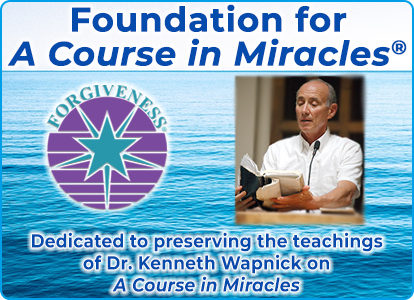
Finding Comfort
Transcription of excerpted audio from Entering God's Presence
Dr. Kenneth Wapnick
Transcription of
excerpted audio from
Entering God's Presence
Dr. Kenneth Wapnick
Press Play arrow to listen.
Kenneth responding to a student's comment: I think the first part of your question, or the first part of what you said, was that the idea that God is Love doesn’t really mean anything to you personally. I mean intellectually it’s a nice idea. Well, the Course would agree. There’s no way we could understand what that means. We say “God is Love,” we think of a person and we all have our notions of love. That the Course focus is never on God and it’s never on truth; it’s always on the ego. So—and we’re all more than aware of our egos. We get angry, we get anxious, we get fearful, we indulge our specialness needs and we’re all very familiar with those— those are the problem. So what you ask for help with is that you look at those problems differently.
And again, ultimately then, it’s really praying to our decision maker to look at the ego, not through the eyes of the ego, which would then make us feel guilty and fearful, etc., but through the eyes of forgiveness, which says there’s really nothing there. And so again, the whole idea of asking for help of the Holy Spirit or Jesus is really asking help of ourselves, but it’s a self we don’t know anything about.
Let me read you at the very end of the workbook, which is very, very beautiful. And it is the kind of thing, when you don’t understand it in the context of the Course, it sounds very Christian almost and the kind of thing that people think of as Jesus. But in the context of what we’ve been talking about, it’ll read differently. This is the very end of the workbook.
(W-pII.Ep.6) We trust our ways to Him [the Holy Spirit] and say “Amen.” In peace we will continue in His way, and trust all things to Him. In confidence we wait His answers, as we ask His Will in everything we do. He loves God’s Son as we would love him. And He teaches us how to behold him through His eyes, and love him as He does. You do not walk alone. God’s angels hover near and all about. His Love surrounds you and of this be sure; that I will never leave you comfortless.
These are very beautiful and very moving lines. But the way Jesus doesn’t leave us comfortless, the way that he is the comfort that we seek is that he reminds us that everything we have seen and felt and experienced is a dream. And it’s a dream that has no effect on reality. That’s the comfort. It’s not that he comforts the way a parent would comfort a child or that we’re comforted because he’ll take away all the booboos and make us feel better. The comfort is in reminding us that everything we believed is wrong.
You know, and to cite one of the workbook lessons, “Beyond this world, there is a world I want.” And the world that I want is the world that Jesus and his love represent. That’s the comfort; that everything we have felt in this world and everything that this world has come from, namely, the wrong-minded system—is wrong. You know, the miracle reminds us that we are dreaming a dream and its content is not true. That’s the comfort. The comfort is that we don’t have to fix the world. We don’t have to fix our rotten personality. We don’t have to fix our decrepit body, because there’s no hope in that. We may fix the body temporarily but in the end, it’s going to die. That what we fix is the mind’s belief that it’s a body and that the dream is real. That’s the hope.

